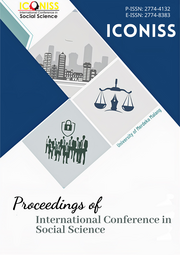Implementation of the Use of Local Government Information Systems (SIPD) in Improving the Effectiveness of the Budget of education technical implementation unit
DOI:
https://doi.org/10.26905/iconiss.v3i1.9040Keywords:
Budget, Effectiveness, Law Number 23 of 2014, Local government information systemAbstract
In governance during the industrial revolution 4.0, the government is required to realize the principles contained in good governance, namely participatory, transparent, accountable, and efficient government supported by an application system. In the contents of Law Number 23 of 2014 concerning Regional Government, regional governments are required to implement an Electronic-Based Government System (SPBE) in the management of their respective regional finances. The mandate of the law is that the Regional Government is obliged to provide Regional Government Information which is managed in the available Regional Government Information System. The use of SIPD is emphasized through Permendagri Number 70 of 2019 concerning Regional Government Information Systems so that when the Regional Revenue and Expenditure Budget (APBD) for the Fiscal Year 2022, SIPD is designed to be more adaptive, responsive, dynamic, innovative, and accountable, local governments have begun to use it. The focus of the research is the implementation of the use of the local government information system (SIPD) in increasing the effectiveness of the Education Budget UPT in Kaliorang District. This research is qualitative research based on the philosophy of post-positivism, used to examine the condition of a natural object, (as opposed to an experiment) where the researcher is the key instrument. The selection of data sources/informants was carried out by snowball and purposive sampling, data analysis was qualitative with data collection techniques by triangulation (combined). Lack of socialization in filling out budget plans often causes errors in filling out because they still do not understand optimally. So that the Kaliorang District Education Unit operator appointed to input the Budget Work Plan (RKA) at SIPD is still experiencing difficulties. In addition, the accountability system that is not independent makes changes to the rules for making accountability reports frequently. The author provides several suggestions, namely: 1) Local governments need to carry out continuous socialization and assistance to guard the filling of SIPD quickly and accurately and 2) Local governments need to provide budgets for increasing the capacity of Human Resources to realize quality SIPD governance and in line with future development planning.
Downloads
References
Alimah, N. (2022). Penerapan Sistem Informasi Pemerintahan Daerah (SIPD) Terhadap Perencanaan Pembangunan Daerah Pada Badan Perencanaan dan Pembangunan Daerah Bappeda Kabupaten Tulungagung (Doctoral dissertation, Universitas Muhammadiyah Malang).
Amanah, N., Budiati, A., & Ismanto, G. (2018). Implementasi Peraturan Menteri Dalam Negeri Nomor 8 Tahun 2014 Tentang Sistem Informasi Pembangunan Daerah (Sipd) Di Badan Perencanaan Dan Pembangunan Daerah (Bappeda) Kota Serang (Doctoral dissertation, Universitas Sultan Ageng Tirtayasa).
Andika, T. H., Setiawan, A. E., Feriyanto, D., Ardhy, F., & Afdhalluddin, A. (2020). Bimbingan Teknis Sistem Informasi Pembangunan Daerah (Studi Kasus Pada Bappeda Kabupaten Pringsewu). Jurnal Pengabdian Kepada Masyarakat Ungu (ABDI KE UNGU), 2(3), 144-147.
Dione, F. (2020). Implementation of Regional Development Information System (SIPD) in Increasing Coordination of Regional Development. Jurnal Kebijakan Pemerintahan, 21-28.
Hamzah, F., Awaluddin, M., Aeni, S., Asdar, A., Erdawati, M., & Siraj, M. L. (2021). Policy on the Use of Regional Development Information System Applications at Regional Development Agency, Bone Regency. Jurnal Ilmiah Ilmu Administrasi Publik, 11(1), 246-255.
Lestarna, G. (2018). Evaluasi Implementasi Sistem Informasi pembangunan Daerah (Studi Pada Pemerintah Daerah Daerah Istimewa Yogyakarta) (Doctoral dissertation, Universitas Gadjah Mada).
Nasution, M. I., & Si, N. M. (2021). Analisis penerapan sistem informasi pemerintah daerah (SIPD) pada Badan Pengelola Keuangan dan Aset Daerah (BPKAD) Kota Medan. Jurnal Akuntansi dan Keuangan, 9(2), 109-116.
Nugraha, A. (2022). Evaluation of Implementation of Local Government Information System (SIPD): Case Study on Secretariat Office of the Council of Representatives Serang City. Review Accounting and Taxation, 1(01), 33-46.
Rachmawati, M. I. (2018). Intergovernmental Network Dalam Perencanaan Pembangunan Berbasis Sistem Informasi Pembangunan Daerah (SIPD) (Studi Pada Badan Perencanaan Pembangunan Daerah Provinsi Jawa Timur). Doctoral dissertation, University of Muhammadiyah Malang.
Rosmayani, R. (2021). The Effectiveness of Using the E-Monev Application System Inthe Planning Process in the Regional Development Planning Agency Of Rokan Hilir Regency. International Journal of Social Science and Economic Research, 6.
Ruhana, F. (2017). Pemanfaatan Sistem Informasi Pembangunan Daerah dalam Mendukung Perencanaan Pembangunan Daerah di Indonesia. Jurnal Manajemen Pembangunan, 4(2).
Salindeho, A. (2021). The Role of Regional Government Information System (SIPD) on the Sub-District of Aertembaga’s Financial Accountability. Indonesian Journal of Multidisciplinary Science, 1(3), 150-153.
Santoso, W. G. (2022). Implementasi Sistem Informasi Pemerintahan Daerah (SIPD) Dalam Perencanaan Pembangunan Di Kabupaten Subang. Doctoral dissertation. FISIP UNPAS.
Setyawan, A., Toha, A., & Suryawati, D. (2022). The Implementation of Regional Development Plan through Regional Government Information System in Jember Regency. Regional Dynamic: Journal of Policy and Business Science, 2(1), 65-72.
Sudianing, N. K., & Seputra, K. A. (2019). Peran sistem informasi pemerintahan daerah dalam menunjang peningkatan kualitas perencanaan pembangunan daerah. Locus, 11(2).
Winarno, P. M., Adhi Kusnadi, and Nunik Afriliana. (2019). Implementasi Sistem Informasi Pembangunan Daerah Di Kabupaten Tangerang. Prosiding Konferensi Nasional Pengabdian Kepada Masyarakat dan Corporate Social Responsibility (PKM-CSR), 2, 117-123.
Downloads
Published
Issue
Section
License
Authors who publish in this journal agree to the following terms:
(1)Â Copyright of the published articles will be transferred to the journal as the publisher of the manuscripts. Therefore, the author confirms that the copyright has been managed by the journal.
(2) Publisher of Proceedings of International Conference in Social Science is the University of Merdeka Malang.
(3) The copyright follows Creative Commons Attribution–ShareAlike License (CC BY SA): This license allows to Share — copy and redistribute the material in any medium or format, Adapt — remix, transform, and build upon the material, for any purpose, even commercially.

